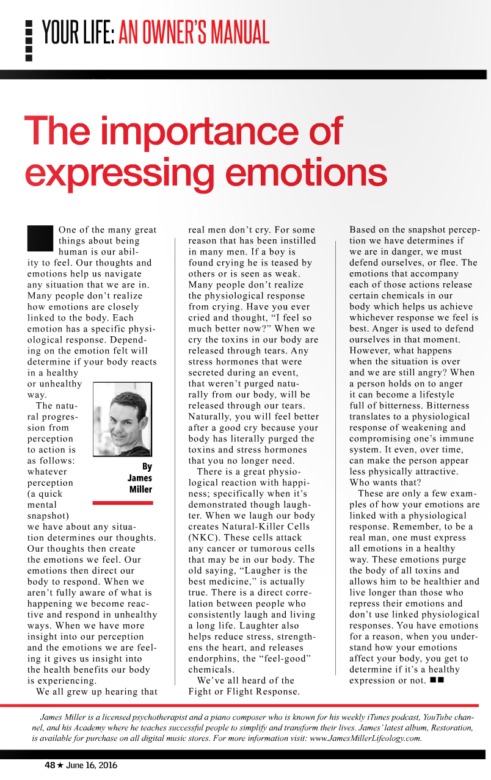One of the many great things about being human is our ability to feel. Our thoughts and emotions help us navigate any situation that we are in. Many people don’t realize how closely linked emotions are to the body. Each emotion has a specific physiological response. Depending on the feeling that is felt will determine if your body reacts in a healthy or unhealthy way.
The natural progression from thoughts to action is as follows: whatever impression (a quick mental snapshot) we have about any situation determines our thoughts. Our thoughts then create the emotions we feel. Our feelings then direct our body how to respond. When we aren’t fully aware of what is happening, we become reactive and respond in unhealthy ways. When we have more insight into our perception and the emotions we are feeling, it gives us insight into the health benefits our body is experiencing.
We all grew up hearing that real men don’t cry. For some reason, this thought is instilled in many men. If a boy is crying, he is teased by others or is seen as weak. Many people don’t know the physiological response from crying. Have you ever cried and thought, “I feel so much better now?” When we cry, the stress hormones in our body are released through tears. During a stressful time, your body will secrete stress hormones and chemicals. If you aren’t able to calm yourself down and release the stress, then when you cry, the stress hormones will be released through your tears. Naturally, you will feel better after a good cry because your body has purged the toxins and stress hormones that you no longer need.
There is a powerful, physiological reaction with happiness, specifically when it’s demonstrated through laughter. When we laugh, our body creates Natural-Killer Cells (NKC). These cells attack any cancer or tumorous cells that may be in the body. The old saying, “Laughter is the best medicine,” is correct. There is a direct correlation between people who consistently laugh and living a long life. Laughter also helps reduce stress, strengthens the heart, and releases endorphins – the “feel-good” chemicals.
We’ve all heard of the Fight or Flight Response. Based on the snapshot perceptions we have determines if we are in danger, and we must defend, flee, or even sometimes freeze. The emotions that accompany each of those actions release certain chemicals in our body, which helps us achieve whichever response we feel is needed. Anger is used to defend ourselves at that moment. However, what happens when the situation is over, and we are still angry? When a person holds on to anger, it can become a lifestyle full of bitterness. Bitterness translates to a physiological response of weakening and compromising one’s immune system. It even, over time, can make the person appear less physically attractive. Who wants that?
These are only a few examples of how your emotions are linked with a physiological response. These emotions purge the body of all toxins and allow a person to be healthier and live longer than those who repress their feelings. You have emotions for a reason. When you understand how your emotions affect your body, you get to determine if it’s a healthy bodily expression or not.
Real men do, in fact, cry.


 We all get overwhelmed and sometimes don’t know what to do. LIFE LESSONS is your new “go-to” book to help you navigate life.
We all get overwhelmed and sometimes don’t know what to do. LIFE LESSONS is your new “go-to” book to help you navigate life.